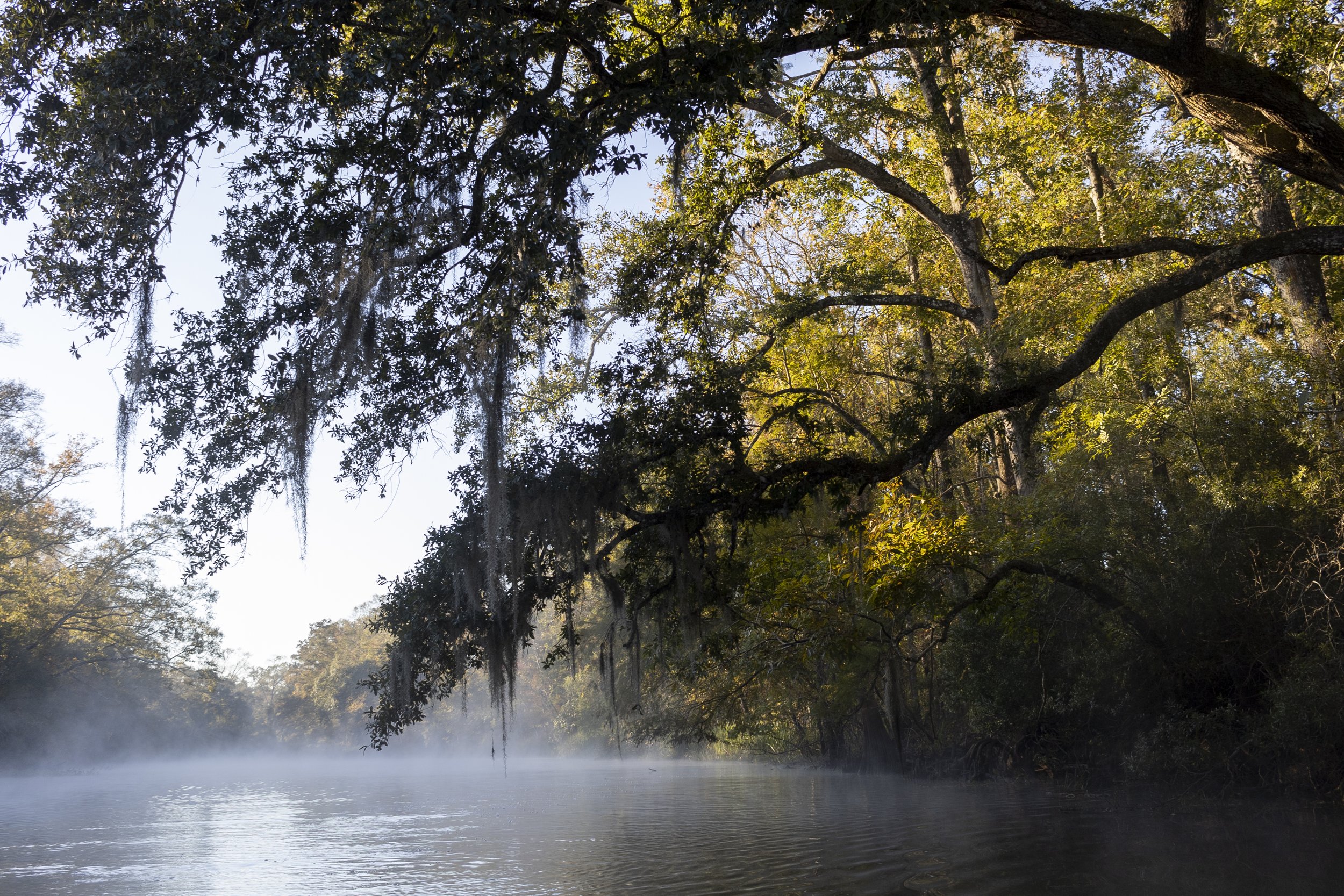
Bayou Mercier
Looking all around me yesterday morning on Bayou Mercier, nothing I saw would have seemed out of place a hundred or even five hundred years ago. Palmettos, live oaks, red cedars, still green; bald cypresses bald for the winter; mist hovering over the water. For all I knew, it could have been a cold December morning a thousand years ago. Wherever I turned my attention, nothing betrayed the illusion. An alligator slipped beneath the surface of the water, sublime and foreboding. Had a dinosaur slipped in beside him, I might not have been too surprised.
Bayou Mercier
Every bayou has its own personality. It’s not a quality you can easily put into words, and a photograph gives you only a taste of it, but when you’re in one, or you’re on one, you can feel it. A bayou is a space, but it’s also a feeling. A feeling of ease, of peacefulness, of wildness, of aliveness, each bayou in its own proportions. What strikes me about Bayou Mercier is how old it feels. Primeval. Elemental. Wild with pretzeling vines, it takes you back in time. Of course, you have to go beyond the human zone, past the new concrete bridge, past the stretch of bayou that follows the levee road, past the noisy traffic zooming down the levee road, back to the native bayou, where it curves toward Catahoula Lake. There, in that snaking mist, that’s where you really feel it.
Bayou Mercier is ancient, but it’s also quite new. The whole Atchafalaya Basin has been carved up, permanently re-engineered and built up with layers of levees over the centuries, and today bears only a resemblance to the paradise it’s descended from. Bayou Mercier is no exception. A hundred years ago, you could climb into your boat in Catahoula Lake, wind through Bayou Mercier, and eventually you’d arrive at the Atchafalaya River. Such a boat ride was actually described in a brochure advertising the Rousseau Catahoula Inn, a state-of-the-art restaurant, music hall and inn that opened on the western shore of Catahoula Lake on Easter Sunday in 1928.
“Among the diversions offered is a most enjoyable excursion twice daily by boat—down Bayou Mercier, thence to Lake La Rose, down Little Bayou La Rose to the rolling Atchafalaya. Moonlight rides on the lake and amusements galore will always be a part of the program each day.”
Bayou Mercier Bridge
Then when the levee came barreling through there in the early 1930s, it cut right across Bayou Mercier, severing Catahoula Lake from the rest of the Atchafalaya Basin and reshaping Bayou Mercier into a much longer bayou running alongside the levee almost all the way to Henderson. So, in a sense, Bayou Mercier is very new. Parts of it aren’t even a hundred years old.
Bayou Mercier’s sister bayou, Bayou Berard, flows from north to south roughly paralleling Bayou Mercier. Bayou Berard, the broader and sunnier personality, handles most of the boat traffic between Catahoula and Henderson. Bayou Mercier is much less traveled. You’re more likely to see an alligator or a bear there. It’s narrower, shadier and shapelier than its sister, and the way the mossy bayou meanders through the lay of the wetland landscape, cutting crosswise, unpredictably, against the east to west passage of the sun, makes it prone to many moods and rich in secrets. Bayou Berard is out in the open. Bayou Mercier is more remote.
Bald Cypress and Dwarf Palmetto
There are no public boat launches or landings on Bayou Mercier itself. Bayou Mercier is about a quarter mile from the boat launch at the park in Catahoula. Go under the bridge, and you’ll see the cut to Bayou Mercier there on the right. You can also use the Bayou Amy Boat Launch in Henderson, but it’s two miles away from the northernmost bend of Bayou Mercier. Which is why I prefer to just pull off the levee road by the Bayou Mercier Bridge, walk my kayak down to the bayou and nose it through the reeds, letting it float out onto the water, holding the long string of it in my hand.
I climb aboard the kayak, muddy boots and all, and before I know it, I’m three thousand years away. A woodpecker laughs, snakes slither into the water, and a primeval paradise, foggy as a dream, dangles just barely out of reach.




